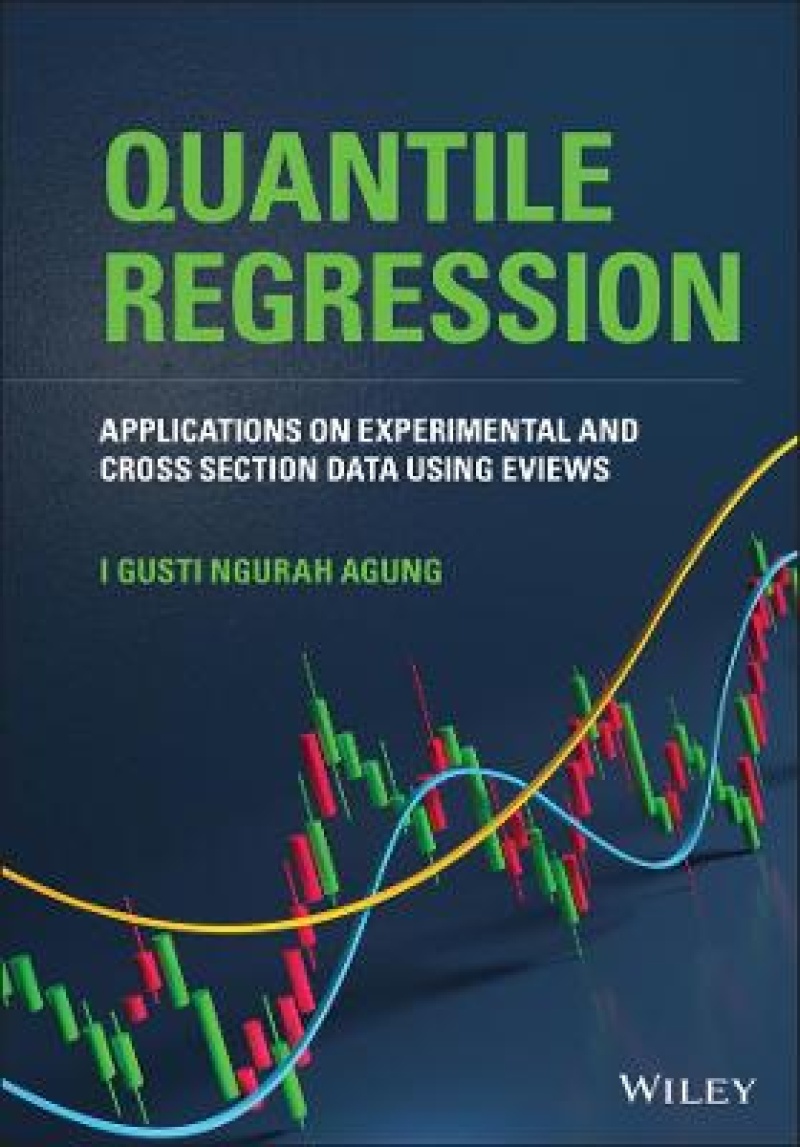QUANTILE REGRESSION A thorough presentation of Quantile Regression designed to help readers obtain richer information from data analysesThe conditional least-square or mean-regression (MR) analysis is the quantitative research method used to model and analyze the relationships between a dependent variable and one or more independent variables, where each equation estimation of a regression can give only a single regression function or fitted values variable. As an advanced mean regression analysis, each estimation equation of the mean-regression can be used directly to estimate the conditional quantile regression (QR), which can quickly present the statistical results of a set nine QR(τ)s for τ(tau)s from 0.1 up to 0.9 to predict detail distribution of the response or criterion variable. QR is an important analytical tool in many disciplines such as statistics, econometrics, ecology, healthcare, and engineering.Quantile Regression: Applications on Experimental and Cross Section Data Using EViews provides examples of statistical results of various QR analyses based on experimental and cross section data of a variety of regression models. The author covers the applications of one-way, two-way, and n-way ANOVA quantile regressions, QRs with multi numerical predictors, heterogeneous QRs, and latent variables QRs, amongst others. Throughout the text, readers learn how to develop the best possible quantile regressions and how to conduct more advanced analysis using methods such as the quantile process, the Wald test, the redundant variables test, residual analysis, the stability test, and the omitted variables test. This rigorous volume:Describes how QR can provide a more detailed picture of the relationships between independent variables and the quantiles of the criterion variable, by using the least-square regressionPresents the applications of the test for any quantile of any numerical response or criterion variableExplores relationship of QR with heterogeneity: how an independent variable affects a dependent variableOffers expert guidance on forecasting and how to draw the best conclusions from the results obtainedProvides a step-by-step estimation method and guide to enable readers to conduct QR analysis using their own data setsIncludes a detailed comparison of conditional QR and conditional mean regressionQuantile Regression: Applications on Experimental and Cross Section Data Using EViews is a highly useful resource for students and lecturers in statistics, data analysis, econometrics, engineering, ecology, and healthcare, particularly those specializing in regression and quantitative data analysis.
Les mer
Ch. 1: Test for Equality of Medians by Series/Group OF Variables Ch. 2: One and Two-Way ANOVA Quantile Regressions Ch. 3: N-Way ANOVA Quantile Regressions Ch. 4: Quantile Regressions Based On (Xi,Yi) Ch. 5: Quantile Regressions with Two Numerical Predictors Ch. 6: Quantile Regressions with Multi Numerical Predictors Ch. 7: Quantile Regressions with the Ranks of Numerical Predictors Ch. 8: Heterogeneous Quantile Regressions based on Experimental Data Ch. 9: Quantile Regressions Based On CPS88.wf1 Ch.10 : QUANTILE REGRESSIONS OF A LATENT VARIABLE Appendix A Appendix B Appendix C Bibliography
Les mer
A thorough presentation of Quantile Regression designed to help readers obtain richer information from data analysesThe conditional least-square or mean-regression (MR) analysis is the quantitative research method used to model and analyze the relationships between a dependent variable and one or more independent variables, where each equation estimation of a regression can give only a single regression function or fitted values variable. As an advanced mean regression analysis, each estimation equation of the mean-regression can be used directly to estimate the conditional quantile regression (QR), which can quickly present the statistical results of a set nine QR(τ)s for τ(tau)s from 0.1 up to 0.9 to predict detail distribution of the response or criterion variable. QR is an important analytical tool in many disciplines such as statistics, econometrics, ecology, healthcare, and engineering.Quantile Regression: Applications on Experimental and Cross Section Data Using EViews provides examples of statistical results of various QR analyses based on experimental and cross section data of a variety of regression models. The author covers the applications of one-way, two-way, and n-way ANOVA quantile regressions, QRs with multi numerical predictors, heterogeneous QRs, and latent variables QRs, amongst others. Throughout the text, readers learn how to develop the best possible quantile regressions and how to conduct more advanced analysis using methods such as the quantile process, the Wald test, the redundant variables test, residual analysis, the stability test, and the omitted variables test. This rigorous volume:Describes how QR can provide a more detailed picture of the relationships between independent variables and the quantiles of the criterion variable, by using the least-square regressionPresents the applications of the test for any quantile of any numerical response or criterion variableExplores relationship of QR with heterogeneity: how an independent variable affects a dependent variableOffers expert guidance on forecasting and how to draw the best conclusions from the results obtainedProvides a step-by-step estimation method and guide to enable readers to conduct QR analysis using their own data setsIncludes a detailed comparison of conditional QR and conditional mean regressionQuantile Regression: Applications on Experimental and Cross Section Data Using EViews is a highly useful resource for students and lecturers in statistics, data analysis, econometrics, engineering, ecology, and healthcare, particularly those specializing in regression and quantitative data analysis.
Les mer
Produktdetaljer
ISBN
9781119715177
Publisert
2021-07-08
Utgiver
Vendor
John Wiley & Sons Inc
Vekt
1021 gr
Høyde
244 mm
Bredde
170 mm
Dybde
32 mm
Aldersnivå
P, 06
Språk
Product language
Engelsk
Format
Product format
Innbundet
Antall sider
496
Forfatter
Biographical note
I Gusti Ngurah Agung, PhD, The Ary Suta Center, Jakarta, Indonesia. Professor Agung taught at the State University of Makassar from 1960–1987, and at the University of Indonesia from 1987–2018. His research has focused on finding expected or unpredictable statistical results based on various models of time series, cross-section, experimental data, and panel data models. In addition, he is also interested in cross-section data over times and a special or uncommon panel data in indexes.
